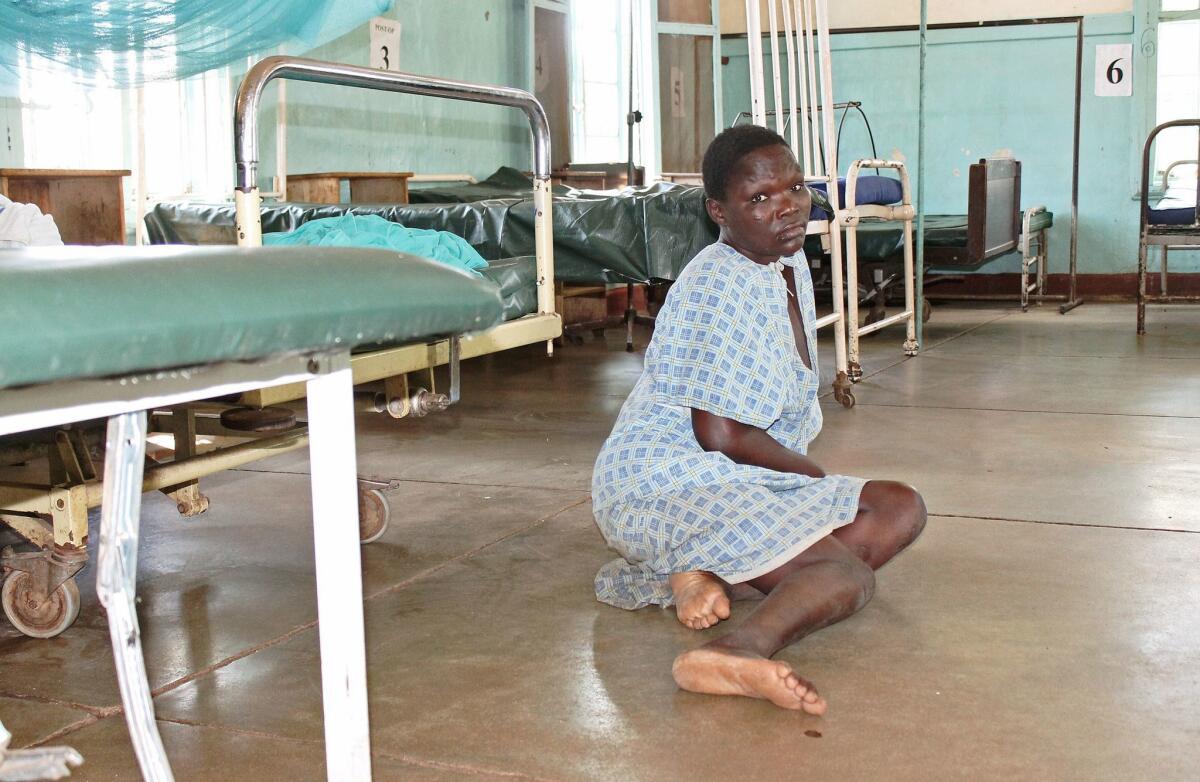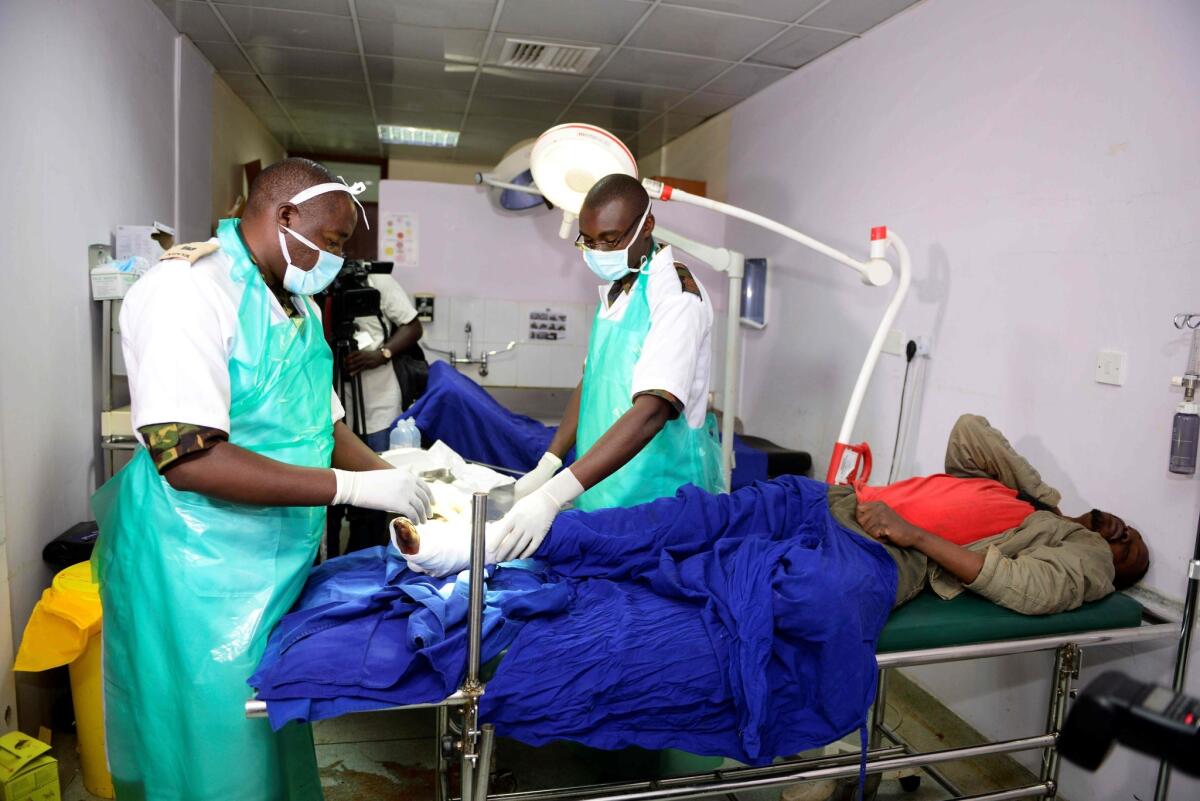As striking Kenyan doctors dig in, patients are forgotten and a baby dies

No one can be sure how many people may have died because of Kenya’s five-week doctors strike, but Dismas Bikundo is sure his baby girl was one of them.
She would have been his firstborn child. When his wife, Edna, went into labor on Dec. 27, the couple was turned away from two hospitals. A private hospital sent him to the nearest government facility, Mbagathi Hospital in central Nairobi, but there was no doctor available there because of the strike at public hospitals. Bikundo rushed his wife to a third hospital run by a Catholic mission.
“By the time we arrived at the hospital it was too late. We lost the baby,” said Bikundo, 24, a casual laborer. “I am still traumatized.”
Medical union leaders face jail and 5,000 Kenyan doctors face the sack after defying a court order Thursday to return to work — but the long-term casualty could be Kenya’s dilapidated health system. The strike will likely trigger a new flood of medical staff leaving Kenya for other countries, such as the United States, Britain, Canada and Australia, where they can easily better the basic pay rate of $1,350 a month and tough working conditions.
Because of the dismal pay, thousands of Kenyan doctors and other medical workers have emigrated from a country where, in contrast, legislators are some of the highest paid on Earth, earning around $20,000 a month, taking into account their generous travel allowances and other perks.
Doctors walked off the job in December over the government’s refusal to implement a 3-year-old collective bargaining agreement, or CBA. The deal would have more than doubled doctors’ pay and increased the number of doctors in public hospitals. Other medical professionals at government-run hospitals also are on strike; nurses went back to work in December.
Public anger over the government’s failure to resolve the strike has been deepened by a corruption scandal in the Ministry of Health exposed late last year. Senior health officials stole or fraudulently diverted around $55 million from the 2015-16 health budget, according to an internal audit.
Implementing the pay deal would cost $126 million annually, a bill that the treasury secretary, Henry Rotich, says the government cannot afford. He claims the 2013 pay deal was rushed into and agreed without adequate consultation.
Kenya may have the largest economy in East Africa but it relies on donor nations such as the U.S., European Union and China to cover more than a quarter of its health budget.
Longtime Kenyan anti-corruption campaigner and activist John Githongo has been seething over the failure of the scandal-plagued government to improve doctors’ pay.
At Nairobi’s main hospital, Kenyatta National Hospital, on Friday, Rachel Nduta wondered if her 2-year-old daughter might be a casualty of the strike.
The child, Megan, was recently diagnosed with a hole in her heart. Nduta said she arrived early Friday morning and waited hours for an appointment with a cardiologist.
“There’s nothing going on here,” Nduta said in a low, sad voice. She had wandered the cardiology wing looking for help.
“But none of the offices in the entire wing is open,” she said.
The government deployed military doctors to work in the hospital to deal with emergency cases, but the emergency wing was silent and deserted Friday. Private hospitals have been overwhelmed by the flood of patients who would normally rely on the public system.
Distraught relatives of sick people streamed in and out of Kenyatta National Hospital on Friday. Some complained that family members were lying in the hospital unattended.
Patients and their family members huddled in the shade of a large tree outside the hospital entrance. The mood was one of despair. Simon Kinywa, 60, a farmer, watched his youngest son, who has cancer, writhing in pain. Eventually he gave up and took his son home.
Martin Amukowa, 18, said his father, a diabetic who suffered a stroke last year, could not get the medical attention he needed.
“This strike has affected so many people,” he sighed, as he too gave up, and pushed his father in a wheelchair to a waiting car.
Kenya has one doctor for every 5,000 people, according to the World Health Organization, compared to 2.5 per 1,000 in the U.S. and around 3.5 per 1,000 in Europe.
Many Kenyan citizens live hand-to-mouth each month covering basic expenses such as school costs, transportation, and food, and any sudden family illness can be a crippling event. Few people have medical insurance but many do not trust the rundown public system.
Informal fundraising events called harambee are frequent affairs, as family members typically scramble to collect donations from friends, colleagues and neighbors for medical bills and medicine — and sometimes for the funerals that follow. In Swahili, the word means “all pull together.”
The striking union, Kenya Medical Practitioners, Pharmacists and Dentists Union, has rejected a government offer to boost pay by 40%, insisting there will be no return to work unless the 2013 pay deal is implemented.
“The government must take responsibility for not getting the doctors back to work,” said the union secretary-general, Ouma Oluga, on Friday. “About 99% of our grievances are actually to do with the patient’s right to access quality healthcare services.
“Between 2013 and 2016, 2,200 doctors left the country out of frustration, to work overseas, mostly in the U.K., United States, Australia and South Africa.”

The doctors’ strike has divided Kenyans, with many angry abut the government’s neglect of the health system, but others frustrated that doctors’ industrial action hurts those they are supposed to care for.
The union argues it is not the strike, but long-standing government neglect of health and entrenched government corruption, including the diversion of $55 million in health funds in 2015-16, that has led to patient deaths.
Some Kenyans believe the doctors should go back to work or be fired. But some of those most affected have sympathy.
“We are all frustrated,” said Nduta, mother of Megan, the child with a hole in her heart. “But it’s their right to demand decent pay.”
Twitter: @RobynDixon_LAT
Dixon reported from Johannesburg, South Africa, and Kyama, a special correspondent, from Nairobi, Kenya.
More to Read
Start your day right
Sign up for Essential California for news, features and recommendations from the L.A. Times and beyond in your inbox six days a week.
You may occasionally receive promotional content from the Los Angeles Times.






